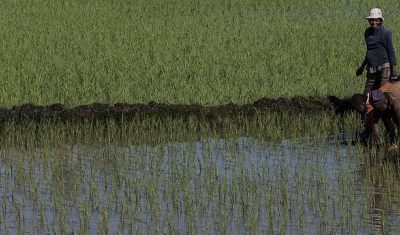Meet our Researchers: Joanna Bourke Martignoni
27 February 2020
Dr Joanna Bourke Martignoni is one of our Senior Research Fellows. She is involved in several research projects dealing with gender, the right to food and land commercialization, as well as with gender equality in the context of business activities, and on economic, social and cultural rights (ESCR) and the Sustainable Development Goals (SDGs).
Tell us about you: What’s your Background?
I grew up in Australia where I studied law, contemporary South East Asian history, geography and political science. During my undergraduate studies, I spent a semester at the University of British Columbia in Canada where I focused on comparative constitutional and indigenous law as well as feminist legal theory, environmental law and human rights.
After moving to Switzerland to complete my Masters' degree in international law at the Graduate Institute I spent several years working at the International Committee of the Red Cross (ICRC) and at the World Organisation Against Torture (OMCT). Following those experiences, I moved to academia where I coordinated the Master of Advanced Studies in Children's Rights and worked on research projects related to intersectional discrimination, the philosophy of international law and secessionist and separatist movements. I completed my Doctor of Laws at the University of Fribourg and my thesis, Echoes from a Different Shore. The Right to Education in International Development was published by Schulthess in 2012.
In addition to these activities, I have also acted as a consultant to the United Nations (UN) Committee on the Elimination of Discrimination Against Women (CEDAW), to the UN Special Rapporteur on Violence Against Women and to the UN Special Rapporteur on Contemporary Forms of Slavery as well to the Office of the UN High Commissioner for Human Rights.
Why Did you Choose to Work in the Field of Human Rights?
I've always been concerned about questions of social justice and inequality and the reason that I chose to study law and humanities was due to a conviction that these are tools that can be used to work towards changing unjust political, economic, legal and social structures.
During my time as a law student, I volunteered in a local community legal centre in an inner-city area where there was a lot of poverty and that experience really sparked my interest in working on issues of adequate housing, social security, indigenous and educational rights as well as on gender-based violence against women. My studies in history, geography and political science also motivated me to pursue inquiries into the political economy of development cooperation and to contextualise processes of colonialism.
What are the Research Projects you’re Currently Working on?
Most of my time is spent as Coordinator and Post-Doctoral researcher on a Swiss government-funded Research for Development project called DEMETER (Droits et égalité pour une meilleure économie de la terre) which examines agricultural commercialization, gender equality and the right to food in Cambodia and Ghana. The project started in 2015 and is now in its second phase and we're currently in the process of carrying out quantitative household surveys as well as qualitative interviews in both countries. The aim is to study changing gender relations within contexts of agricultural and land commercialization and to examine what these mean in terms of the availability, accessibility, quality and sustainability of food for people living in a range of rural communities in Cambodia and Ghana.
I'm also involved in ongoing research on gender-responsive human rights due diligence for businesses and on the SDGs and ESCR.
Why are these Projects Important?
These projects are important in that they draw attention to issues of gender and other forms of inequality that are often obscured within the global processes of neo-liberal development. By taking an explicitly rights-based approach to these questions of socio-economic and political transformation we're able to identify structural injustices and document the impact that these are having on the human rights of specific populations.
The DEMETER project provides longitudinal, empirical data that can be used to track changes in peoples' livelihoods, in legislation and in social policies over a six-year period. The gender-responsive human rights due diligence project draws attention to specific contexts – supply chains, land-based agricultural investments and conflict zones – within which there has not been an adequate amount of attention paid to the gendered human rights impacts of business activities. The work on the SDGs also highlights many of the same themes by explicitly linking human rights-based accountability mechanisms with the 2030 Agenda and demonstrating the need to ensure that pre-existing human rights obligations to respect, protect and fulfil ESCR are being implemented by all stakeholders.
What will be their Impact?
We hope that by communicating our results in various formats to different audiences – policy-makers, civil society, international organizations, businesses, academia – we can develop more effective policies, legislation and programmes to ensure the realization of human rights for all people.
According to you, what are the Key Challenges today Human Rights?
The reticence to adopt a binding treaty on business and human rights and the failure of the international community to effectively address the climate crisis are, in my view, two huge challenges that we face as human rights advocates. The growth of authoritarian populist movements and the seeming inability of democratic processes to counter xenophobia and to address questions of inequality are also serious impediments to the development and implementation of more just social policies.
On a More Personal Note: What do you Enjoy doing in your Spare Time?
I love reading fiction, distance running, growing trees, travelling and spending time with family and friends.








